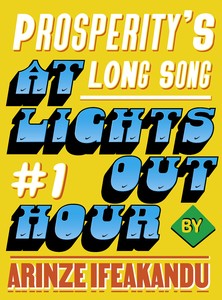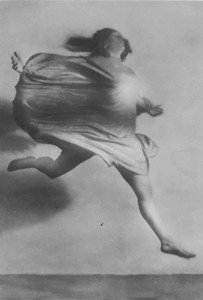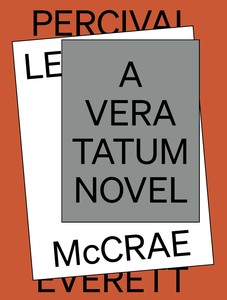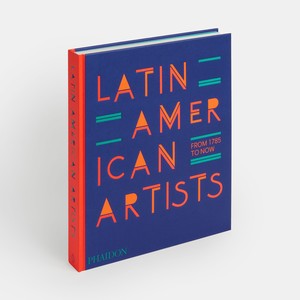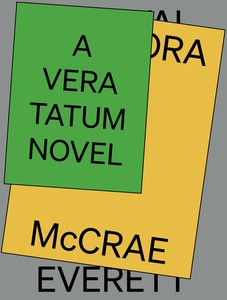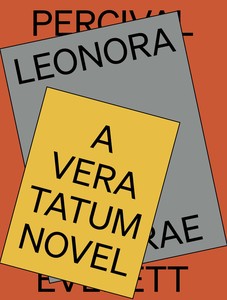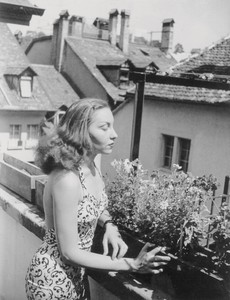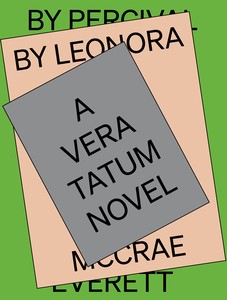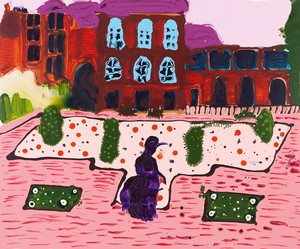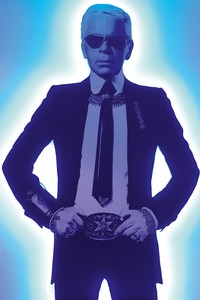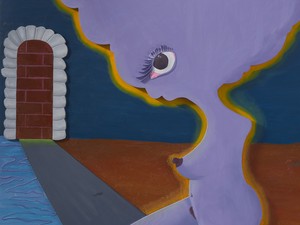She moved along the River’s current on something of a cloud. Her feet hung off the edges, toes bathing in the translucent shimmer.
Up ahead, a tiny, blinking red light beckoned to her. < . . . come closer . . . >
She leaned forward, directing the cloud and gathering speed in the rushing flow of white, as her rainbow-petaled skirt and beaded top fluttered. As she got closer, a parting mist revealed the little light coming from atop a tower. And then it stopped blinking. Suddenly, a flood of golden light burst from the tower. A thick beam began to draw a circle around its surroundings. She lifted her arms and tried to cover herself as the beam inevitably made its way to her. She felt the flash of overwhelming brightness catch her whole and winced as she heard a dark, scratchy voice and an agonizing scream.
Buck, buuck, buuuck. A disgruntled hen ran by her bed, chasing its chicks. She opened her eyes only to close them immediately. Her sleepy eyes could not bear the sunlight making its way through the gaps of old wood on the thatched roof. It was especially loud that morning, with the sounds of the ferry and its passengers moving down the River just yards from the Village. She groaned in resistance, having lost the dream.
Fresh, unfiltered morning-thoughts traveled her mind: where do those dreams go? Why can’t I remember them when I’m awake? Is it that I hold onto them, ever ready to visit them again in the world of sleep? Or maybe I’m slowly letting them out into this world as I speak, as I touch, as I live?
She stretched her hands out as if grasping for the forgotten dream.
She yawned as her eyes widened and turned back toward the persistent sunlight and stared at the narrow beams of light that were catching bits of dust in the air. Past the midpoint of sleep and wakefulness, she folded her arms behind her head and thought, A moon has passed since Ammu and Baba have gone. I suppose I can sleep in as long as I’d like. The Elders say there’s nothing to do but wait out the heaviness.
Deciding not to soak herself in grief, she got up, folded a thin cotton sheet, and shook the jute atop her stone bed to relieve it from what it had caught from her body as she slept.
She could be sixteen, though no one knew for sure. Her Baba said she was born when the rice paddies were ready for harvest. Her Ammu said that the calf had been born a few days before. She wondered if the calf was still alive; the Elders sold it down the River to clothe the Village when her parents passed away, as was tradition. Everyone by the River wore the same beaded cream-colored tops with light petaled skirts or loincloths. And everyone listened to whoever was oldest.
She finished all the schooling available on her side of the River but held off on going to the college, a thirty-minute ferry-ride away. After Ammu and Baba’s passing, she felt the need to bask in the sun for as long as possible. She spent her days sweeping, feeding the chickens, ducks, and goats, and collecting water from the well. She sat meditatively with the Elders and fanned them when it was especially warm. Mostly she walked, watched the crops grow, and spoke lightly with her neighbors.
That morning she sauntered to the well with a bucket for water, hoping to dislodge the remaining sleep from her body. There, a Village child ran to her. Barefoot with a toothy smile, he was panting in glee to tell her there was a call from the Outer World. Fupa Chaji, her uncle and aunt, had called the Village phone. She quickly cupped water from the bucket, swished it around her mouth, smoothed her face with her wet palms, and followed the child, leaving the bucket behind. The last time Fupa Chaji had called was when Ammu and Baba passed away, to offer condolences and remittances for the Elders.
It was always a talking point when someone called from the Outer World, which was anywhere beyond the scope of the River and the Island. So naturally the entire Village had gathered round the stand where their only phone was stationed. The stand also sold herbs, potato chips, and, sometimes, kerosene for lamps. The Elder man in charge of the stall waved everyone off, but they merely shuffled.
The Village watched her take the phone. On the call, Fupa Chaji said they had sorted out Papers for her to visit the City and consider schooling there. She told them about the college down the River but they scoffed. “Come an’ see fo’ yourself. Juss one buildin, you’ll be finin’ three o’ the bes’ schools. Us River folk out here makin’ a life an’ you tryna stay?” After a pause, they added, “Come now, jussa visit. Y’know yuh parents always did wantchya ta see the City.” She hesitantly agreed, thinking of Ammu and Baba. She passed the phone to the stand’s Elder. She watched the Elder nod diligently and agree to Fupa’s rapid commands. The phone clicked with a slight ring. Beaming, the Elder announced, “In half a moon, you’ll be brought down the River to the airport.” The Village applauded. She gave a feeble smile and ran, remembering the bucket by the well.
She forced herself to move forward despite being encapsulated by the bright hot lights. The painful squeals were growing louder and louder. She grasped her head to close her ears from the agony only to realize she was holding on to something white and serrated in her hand. The red light blinked at her: < . . . let it go . . . >
And so she did. It fell onto her feet. Quiet and tranquillity returned.
She scrambled to look at her feet. Five toes on one foot. Her eyes widened. And four on the other. She counted over and over again. Four toes spaced out evenly and perfectly. As if she was born that way.
After two ferry rides down the River, an Elder woman handed her a folder with the Papers and emphasized a small book with an embroidered cover. “Your Entry Book,” the Elder said importantly. “Without this you cannot leave. Stick it to your body like it’s part of your soul.”
At the airport entrance she held a ticket in her hand. Barcodes, dates, her name next to the Entry Book number. Her insides seemed to shape-shift. For the fifth time, she felt around to check she had her Entry Book. It felt foreign yet vital to her, and seemed to be the heaviest thing she was carrying besides the ticket.
She hadn’t even opened it until after she had submitted her luggage and people in uniforms flipped through its pages and asked, “Where? Who? Why?”
Now she was sitting and waiting to board the plane staring at the Book.
“I’m really leaving the River.”
She looked at a frozen version of herself and inspected all the details deemed necessary to leave the River home. Below her name, a birth date. Ammu said that the calf was born between the fifth and the sixth season. But was this really the day she was born? She frowned. The month didn’t match Ammu’s words. Then she counted backwards. According to the Book, she was three years older. Nineteen.
Did Fupa Chaji know more about her than she knew about herself? Because this was a forever date. What else would define her forever, and be absolutely wrong?
Fupa Chaji had told her that there were opportunities to make a life in the City. It seemed impossible to think so, as she struggled to place herself among its gray buildings. She wondered, What does it mean to make a life for yourself? Is what I’ve made here by the River meant to be discarded for something more?
She was wearing the same cotton top and petal skirt she always did, and her feet were in a pair of jute sandals she had made herself. She wiggled her toes, letting a draft of wind sweep into the open spaces of her feet. Her pinky toe was always the strongest despite being the smallest, able to stretch the farthest from its companions. She stared at her toes amused—they moved as if they had lives of their own.
She heard the boarding call and rose to attention.
The City airport was teeming with people that looked unlike her. Her legs felt the sudden cold of the new world she had arrived in. Fupa Chaji were standing primly and waved to her. She burst out smiling as she saw them from afar and pulled at the luggage behind her. The two were wearing clothes that she had never thought of them wearing. She felt a bit out of place in her colorful skirt.
Fupa looked her over and spoke first, “Juss like a River girl.” He glanced at Chaji and they laughed.
“A Transporter’s waiting. Quickly!” They motioned her to follow. Everything passed by in a blur. Next thing she knew she was sitting in the backseat of a car with Chaji. Fupa was at the front next to the Transporter.
She looked at a little box set underneath the mirror, numbers rising as they drove. It blinked like time yet grew in an indecipherable pattern. Though the view out of the window ought to have excited her more, she kept glancing at the growing numbers, wondering how far up they would go.
Chaji turned to her, “We finally have you.”
Fupa added, “An’ soon, you’ll be City folk. We gon’ getchu ta stay.”
The Transporter raised his eyebrows and looked up at the mirror. She watched his eyes find hers. “New here?”
She nodded at the eyes in the mirror.
He gave a sigh and took a sharp left turn. “We’re a City alright. City o’ Hustlers. Pay you mind, don’t be Hustled now.”
She looked at Chaji perplexed, and Chaji mouthed, Pay no mind.
Fupa clapped his hand over the Transporter’s arm. “Ain’t you right?” The two guffawed. She saw the numbers jump up again.
As they drove, she saw houses decorated with figures of all sorts—frogs, birds, winged babies. But what surprised her was statues of stumpy men with tall hats. They looked like squashed versions of Shadho Baba, a mythical entity said to bring blessings to the River. The car stopped at a light and she saw yet another of these figures next to a little windmill.
“What are those?” She pointed at the hatted figure.
“Birdhouses, statues . . . ” Chaji said absentmindedly.
“Yes, but what about those?” She jutted her finger against the window harder and then gestured toward a beard and a cone-shaped hat. Fupa looked at her bewildered.
A look of clarity shone on the Transporter’s face.
“Them gnomes? Little things, long cones for hats?”
“Yeah. What are they?” she asked the Transporter.
“Come from another Island. Meant to protect and keep watch over what’s hidden by their Owners. Guard what’s underground.”
“Guard what’s underground . . . ” she echoed.
Fupa interjected, “Nuthin’ us River folk are familiar wit’ but—” he jerked as the car gave a start—“ugly lil’ things though.”
The car parked in front of a white house with a red roof. It was in need of repairs but still impressed her: it was vastly different from the tin and wooden River homes. Fupa extracted the luggage from the trunk while Chaji paid the Transporter.
“Wait, but—” the Transporter pointed at the meter.
Chaji tched and shooed him away. The Transporter’s jaw tightened. He slapped the meter, resetting it to the number it began on at the airport, and drove angrily away.
Chaji jabbed an elbow at her. “Riggin’ meters. Then givin’ us big talk ’bout Hustlin.” Then, remembering something important, Chaji opened her hand: “Bes’ give the Entry Book and Papers here.”
She furrowed her eyebrows, remembering the Elder woman: “Stick it to your body like it’s part of your soul.”
Even if she left the River, Chaji Fupa were still the oldest, so she should listen to them. But she mustered, “I can keep them safe.”
“Can’t be too sure. Come, they’ll go in the safebox. Plus, we need ’em to sort out the rest.”
“The rest?”
“Mhm, not easy to get in an’ out of this City. You know the trouble we went through to getchu?” Chaji’s eyes became smaller and held a glint: “Iss whatchyuh parents wanted.”
Waves of guilt and grief crashed over her in sequence. Chaji Fupa had brought her to the Outer World for Ammu and Baba.
She handed over the folder with her birth certificate, return ticket, and, tucked into a corner, the Entry Book.
“There we are. We’ll lock this away,” Chaji said as Fupa unlocked the front gate.
“Now let’s go.”
She was brought to the attic of the house, where she plopped herself down onto a large plush mattress on the floor. There were full plastic bags lying about her on all sides. Fupa Chaji must not use the room for much except storage, she guessed. She went to a small window, curious to observe what could be seen from the house.
The sun was setting and the sky was darkening with hues of indigo. She mostly saw the tops of trees and the roofs of houses, but if she looked hard enough, she could see the top of a Lighthouse. It was like a guard on duty, aware of her arrival, blinking at her from afar with its red light, as if communicating something. Suddenly she was enveloped with a peculiar feeling, as the light blinked at her. “I have seen that light before,” she thought.
She nodded off, looking forward to the next two weeks of being shown around the gray city, curious what her parents wanted her to see.
The City was known in the Outer World for many things, many of which were intangible. But one of the things worth seeing was the Lighthouse. It was absurdly large, and out of commission, but below it was a mecca of people who had come to witness its absurdity. At 11 pm, it shone a bright light around the city. No matter where you were, there would be a flood of golden light, as though roaring thunder would soon follow.
Whenever she saw the Lighthouse, she could not look away. Why was it built there? Who was the light shining for? And so, every night at 11, she sat by the attic window, watched the red blinks, and awaited the spectacular rush of light.
The first week, she learned how to ride the City’s above-ground trains and walk its wide, busy roads, which were embroidered with offices and shops. She was shown the cobbled-together neighborhoods of people who came from the River and other Island countries near it and watched Fupa Chaji haggle in markets.
On the eighth night, as she was peering out the window, counting red blinks, awaiting the flash of light, Fupa Chaji came up to tell her she ought to gather her things in the morning. They needed her to shift rooms.
The next day, Fupa unlocked a door blocked off by a large fridge in the kitchen on the ground floor. She had never noticed the door until then; it opened less than a foot before it banged against the fridge. She watched as Chaji slipped sideways into the narrow gap and took rehearsed steps down into a dark basement. Fupa wore a glycerin smile and urged her to follow. She took a deep breath, unsure whether she could fit her bones and skin through the gap. Somehow she managed, finding her footing on the narrow staircase and holding onto the walls. Below, Chaji turned on a single light bulb, pointed out a small fridge and a stove, and then whispered, “The others might be sleepin’.”
Others? Sleeping? She thought. It was 1 pm.
“Some o’ them work in the evenin’, buh mos’ are out now. We good help, y’know, hard to find space in this City.”
She noticed Chaji’s tone had changed slightly. Chaji grabbed her hand and continued whispering, “Listen, Fupa and I, we not doin’ so well spendin’ so much on the Papers to getchu.”
Her insides writhed with guilt as Chaji pulled her down a hall. “Now there’s some trouble with them Papers. Follow me.”
There was a narrow corridor of doors. She counted seven, including one at the end of the hall, the one Chaji was opening.
Strange, she thought, the doorknob is reversed. Usually people open a door with a key from the outside and lock it from the inside. But with these doors, anyone could lock it from outside. You needed the key to get out.
“This is where you’ll stay ’til we get them Papers sorted.” There was a narrow bed, a wooden desk, and a plastic lawn chair. A small out-of-reach window showed a bit of light and pavement. Chaji sat on the bed and motioned for her to join.
“Had ta cancel your return ticket . . . don’t know how much money we need ta fix the issue. ’Course, you need to pay for this room and Papers. . . . ”
“Pay? But how—?”
Chaji wore a strange smile. “There’s a job in a gift shop inside a nice hotel. The Owners agreed to have you. They’ll give us your wages. We can use ’em to pay for you.”
“Can’t I jus—“
Before she could suggest another plan, Chaji pulled a plastic bag from under the bed. Dust billowed throughout the room.
“The Owners are givin’ us a big chance. Look—work clothes.”
Her aunt took out a black blazer, pants that were less black, and a pair of awfully worn dress shoes that looked plastic.
She stared at the clothes.
“You’ll work ’til we get things sorted, yeah?”
She gulped as Chaji’s piercing eyes met hers.
“Then . . . I can go back to the River?”
Chaji shot up and walked to the door. “Of course, but dear, bes’ only go ta work an’ come straight here. Speak to no one of this. Dangerous not ta have Papers in the City. Fupa, me, the other tenants, we all gotta leave if anyone knows.”
Chaji twisted the doorknob. “By the way, we got a matta’ to tend to. So Fupa and I need ta leave the City tomorrow.”
“When will you be back?”
“Couple o’ months,” Chaji said vaguely. “Now be ready by 4 am tomorrow.” Chaji quickly shut the door.
The gift shop was shaking, its fragile items threatening to fall. She heard the familiar horn of an approaching above-ground train. Her palms and nose pressed up against the locked glass doors as she watched the train rush past. When it finally came to a crawl, the doors of the last car opened. The Conductor motioned her to board, but she gestured toward the chains in front of the glass doors blocking her from escape. The Conductor came out of his control center and unlocked the chains with one of his many keys hung around his belt. Hearing the beeping of the train doors, she knew that time was running out.
At 4 am the next day, she left the basement through its separate side door. Fupa Chaji stood in front of the house as a Transporter came out of a sleek black car and took their luggage. Fupa handed her an envelope before entering the car. Inside was an address, directions, a TrainPass, and money for essentials.
She waved bravely as the car drove away and took a deep breath.
“They’re gone,” she admitted to herself as she walked to the train station.
At the station, she circled her eyes around the map to memorize her path. She heard the morning train approaching and ran, remembering they seldom came. She leaped onto the train. Its passengers resembled zombies, looking straight ahead with barely open eyes.
After some wrong turns, she found the hotel crammed among tall gray buildings. The Doorguard opened its brass door and, with an odd smile, said “Welcome.”
Her mouth fell open as she walked into the lobby. She was struck by gold banisters, crushed velvet, and explicit lavishness beyond imagination. The walls were decorated with fine oil paintings and everything looked soft yet untouchable.
She approached the Concierge, a suited man with slick hair. He scanned her top to bottom and pointed to a gold sign fixed on a wall: “Gift Shop,” with an arrow pointing down a set of wide red-carpeted stairs. The carpet made the tightness in her shoes somewhat bearable but her comfort ended at the threshold of the tiny shop, where the Trainer stood.
The shop was filled to the brim with everything from toe trimmers to umbrellas, from mini-Lighthouses to medicines. With barely any room to move, a careless turn could send things to the ground. She was immediately overwhelmed by the heat from the shop’s tiny lights, which were far too many. She heard a low-pitched scream that rattled her insides. She looked down instinctively at her left shoe. It looked ready to burst at the seams.
The Trainer studied her briefly, reached for the phone by the till, and said in a nervous whisper, “Gotta call the Owners.” His hand shook as he placed the receiver against his ear and pressed a red button. She heard warbling from the other end and was reminded of when Fupa spoke to the Elder at the Village stall. This went on for about five minutes, though felt much longer. The Trainer sighed as he put the receiver in its place.
When she pushed at the glass door, she saw through the glass it was chained shut. She was locked in from the outside.
The Concierge waved at her from the other side. He snapped his fingers and a velvety Chair with dark-mahogany wood appeared beside him.
“Help me,” she said, though no sound came out.
He smoothed his hair, flashed a wide smile, and vanished.
He whispered, “Show the Guests class and respect. Not just anyone can stay in this hotel. The Owners say we gotta match the environment.”
The Trainer taught her how to operate the till and count its money. From the till he pulled out a long scroll of receipt paper. “Price changes.” He studied the list. “Red umbrellas up by two, and that Lighthouse up by five.”
“The Owners leave notes at night?”
He shrugged. “Maybe. Never seen ’em.”
“Fuck,” he hissed and continued reading. She looked at him curiously. “Careful counting. Come up short and it’s out of your paycheck. They like to take a bit more to make sure it won’t happen again.” He growled, “At this rate I’ll never get out of here.”
“The Owners change the prices, then say to memorize ’em because it’s classier. No price stickers.” She looked around bewildered. There were hundreds of items.
She spent the next six hours learning prices and reciting them to the Trainer until he was satisfied. Her feet felt as if they were about to burst into flames and melt her fake-leather shoes off.
The Trainer introduced her to the Concierge and the Doorguard in the lobby. Her left toe squirmed as the Concierge tsked, “Young thing. Standing all day. We’ll need a Chair for you.” The Doorguard said nothing and stared at her darkly. The Trainer took out a chain and a lock from his pocket.
“Come, you’re ready.”
They walked back down the stairs and she watched the Trainer close the shop’s twin glass doors, thread a chain between the handles, and snap a lock on. Handing the key to her, he said, “Everyday 6 am to 8 pm.” Before she could say anything, he jumped up the stairs, saluted the Doorguard, and left.
She was surrounded by floating slips of paper with items listed with their changing prices.
Toe trimmers 4.99 //
Solotoids 3.25 //
Hope Bar 4.25
Memorize them, it’s classier. Staticky warbled voices echoed amid bright lights. She tried to grasp the pieces of paper.
ClawLock 16.99 //
Hedgate 5.99 //
Highlow Patches 4.99
The lights stung her eyes, yet she felt compelled to count the cash in the till. If she counted everything she could go home.
She awoke from a stupor on the train home. It was a vibrant day and the sun was shining through the train windows. She felt soothed by the natural light, having escaped the sickeningly bright lights of the gift shop.
The blue sky felt out of reach and looked smudged because of the unwashed windows. She thought to herself that the skies had a way of remaining no matter where people went in the world. She thought of the River, where she could easily venture outside, take walks, and greet her neighbors. But now, she was alone, without her Papers and Book, far from the River and living in a City basement.
From afar, the Lighthouse was watching her with its one red eye.
She pressed the red button to call for the Owners but no answer. As if the only way to reach them were the pieces of paper, she grabbed a floating bit of paper and scribbled, “I’m trapped.” But these markings shape-shifted, turning into forever changing prices:
Everuby 21.99 //
InterChargers 15.99 //
Boasty Biscuits $1.99
She could see the Doorguard smiling down at her. She waved her hand feebly at him, unlocked the chain, and entered the shop. Numbers still fresh in her head, she took a roll of receipt paper and a pen and began to expunge the information from her brain.
A Guest walked in holding their stomach. She greeted them. They grimaced—at her or at their own pain, she didn’t know. They grabbed a pink box and grunted while pressing some bills to her.
“6.99,” she recited and carefully operated the till as she had been trained, relieved it was cooperating.
The Guest pressed their stomach a bit more, grabbed the receipt, and left unsteadily.
< . . . never say much, do they? . . . not even a thank you . . . > A scratchy voice echoed.
She jumped up and looked around the empty gift shop.
< . . . especially when they’re trying to hold in a shit . . . > She gasped—the voice felt as if it came from her head.
She glanced around nervously and saw a periwinkle-blue ceramic Gnome staring from a pile of flag-adorned sweatshirts. She picked it up and held it against her ear. But nothing. She shook her head and placed it next to a Lighthouse.
<Hm, I didn’t see you before and I don’t know how much you cost.>
The Gnome continued staring with its black eyes.
After her shift, she locked the glass doors. And as she did, she thought she saw a blinking red light come from one of the Gnome’s eyes, as if winking at her.
The numbers faded in and out and kept changing. Still, she tried to remember them.
Catchews 2.45 //
Controllite 2.99 //
Lighthouse 10.99
Wearing a skirt and jute sandals below her blazer, she crossed one leg over the other, feeling naked and ill-prepared.
The Guests . . . Respect . . . Class . . . match the environment.
Another 6 am arrival. She yawned in spite of herself and caught eyes with the Doorguard, who grimaced at her. “Wear that smile,” he said gravely. Or was he saying “Where that smile?” She never knew. Still, her face broke into a plastered expression on just-woken skin.
She fumbled around for the key and unlocked the chain on the glass-door handles. She turned on the excruciatingly bright lights with her eyes closed, hoping that would help her acclimate to the shiny shop.
The shop felt more and more like a holding cell every day. All the Guests ever seemed to need were pink tablets to relieve their upset stomachs and tiny breakable umbrellas on rainy days. Why does this gift shop house so many ornate trinkets? she wondered resentfully. She glazed over the ceramic and plastic statues scattered throughout the shop. “26.99, 34.99, 8.99, 12.99. . . . ” Her head hurt as she matched their most recent prices to their image.
Lately all her dreams consisted of memorizing the ever-changing prices of sewing kits, batteries, miniature statues, yet the Owner never once listed the Gnome on the sheets of paper tucked inside the till. They never picked up her calls.
She gave a hard stare in the direction of the Gnome, which had found itself a new place between a bejeweled elephant and a row of toe trimmers.
<When and how did you move?>
The Gnome’s eyes pierced hers. Its carved smile seemed more pronounced and was saccharine sweet. Its voice scratched inside her head: < . . . new Guests . . . >
Her eyes darted to the lobby. Three children and two adults walking in front of a bellboy carting a pile of luggage over the thick carpet.
No carpet here, she thought.
The Concierge had told her yesterday, for the sixth or seventh time that month, that he would bring a Chair. She heard an agonizing scream from her toe below.
Her right hand writhed over her left and her eyes shifted this way and that. She freed her feet from the shoes, for just a moment, and took a slow breath. She had to take matters into her own hands.
The small room in the basement flashed with an intense white light. The Lighthouse. . . . It must be 11 pm, she thought. Her feet were throbbing and pulsating. Her toe’s screams were ringing and coursing through her body like hot thick blood. “Shhh. . . . ” she tried to soothe it and closed her eyes, falling onto the bed.
“You’re killing me.”
Basking in the light, she breathed out, took the white knife in her hand, and effortlessly swiped the toe clean off. It floated away before her, its last word marked with blissful accusation: “Murderer.”
Having finished the job, she smiled softly. It’ll never cry again, it’ll never accuse me again. I won’t even miss it, she thought peacefully. She was enveloped in a rushing current, cold and refreshed.
She opened her eyes.
Just a dream.
But there was quiet in the room and relief in her body. She scrambled to look at her feet. Five toes on one foot. Her eyes widened. And four on the other. She counted over and over again. Four toes spaced out evenly and perfectly. As if she’d been born that way. She flexed her toes and realized she was gripping a white plastic knife. It was bent awkwardly and its serrated edges had dulled. She gasped and let it go.
The next day she came in springing up and down and unlocked the gift shop in a chipper mood.
The Gnome had placed itself by the till. It seemed to narrow its eyes at her. But she smiled anyway. Her shoes fit perfectly and everything felt bearable.
The Concierge came in with a smirk: “Darling. . . . ” She greeted him brightly.
He peered down at her worn shoes. “Perhaps . . . they’ll be bringing the Chair tomorrow,” he said silkily.
“Very well,” she said with a bounce.
He looked at her with an expression of alarm.
As the Concierge left, the Gnome’s voice scratched at her. < . . . think he knows? . . . >
<Knows?> The last word echoed in her head as she opened the till. No notes from the Owners, she thought happily.
< . . . that you cut it off . . . that you’re a murderer . . . >
Her smile broke. Eyebrows twisted, she picked up the Gnome and stared at it fiercely.
<I did what I had to do.>
She set the Gnome down hard by the till. It made a large clunk. She fumed. Her forehead grew hot and the lights became unbearable once more. Cackles ricocheted between the temples of her forehead as she pulled her hair.
< . . . you’re a liar . . . a pretender . . . >
<I’m not! I’m not . . . lying or pretending. Fupa Chaji are getting paid by the Owners. This is only until we sort out the Papers. I’m just doing what the Owners say. Then I get to go home and . . . >
A young boy in a striped white-and-blue shirt and khaki shorts had walked in, looking wide-eyed and surprised. He looked at the Gnome, then at her.
“Oh!” her ears burned. “How can I help you?”
He shifted his feet nervously and held a PayCard in his fist. She folded her hands as her Guest smile slowly made its way onto her face.
The Gnome whispered, < . . . he’s just like you . . . >
<Odd. Don’t you usually have something horrid to say about the Guests?>
< . . . oh, he’s not a Guest . . . >
A feeling of dread invaded her. She peered over to see the boy staring longingly and sadly at the items around him. She watched him intently, then approached him.
“What are you looking for?” she asked gently.
Startled, he leaped up, and dropped the PayCard. She smiled and bent down to pick it up. She read the name on the card aloud.
“Is this you?”
He shook his head fiercely.
“Oh,” she replied simply, handing the card back to him. “Sorry, but I can’t sell to you then.”
He pursed his lips and stared at the card. Then he looked back up and nodded slowly.
She heard a pounding whisper in her left ear. < . . . thief? . . . > And then in her right ear. < . . . or just doing what the Own— . . . >
Two children ran in, one of them screeching, “Stupid, what’s taking so long? We’re waiting.”
The boy looked up, sighed, and spoke with downcast eyes. “Sir needs to buy it. I can’t.”
One of them gave a snort, grabbed the PayCard from the boy’s hand, and shoved him aside. The other ran up the stairs and whined, “Father!”
The boy kept his head down as the other child in the shop began touching items carelessly. His shoes were tattered and ripped around the edges. The other child seemed to be wearing the cleaner, newer version of them.
<No, not a thief,> she decided. <But out of place.>
< . . . very out of place . . . yet in his place . . . > said the Gnome darkly. < . . . just like you— . . . >
As the other child came back with their Mother and Father, she heard the sound of something breaking.
Their Mother gasped. “Darling, are you alright?”
The child took a step away from the shattered pieces of ceramic with a defensive look: “I didn’t do anything, it fell by itself!”
The woman looked at the boy menacingly. “You’re supposed to watch them!”
The boy continued to look down.
The Father kicked the shattered pieces to the side, said “Get me a lighter” dismissively, and pulled out another PayCard from his pocket.
She swallowed the chaos, wore her Guest smile, and gestured to a row of lighters.
“Here you are, Sir.”
He rolled his eyes, grabbed one at random, gave it a trial flick, and slammed his card down. She inhaled sharply but discreetly while she rang him up and handed him a receipt.
As the Guest and the boy were about to leave, she stopped them.
“Sir . . . ” pointing at the broken ceramic on the floor. At that moment she realized it was the Gnome, in pieces, blue and white, scattered and smashed.
“What?” The Guest growled, knowing exactly what she was implying. But she just continued to stare at the broken Gnome.
<Can you hear me?> She thought at it.
<I can.>
But it wasn’t the Gnome’s voice. It was the boy’s. She turned to him swiftly. They both looked surprised to have heard each other’s thoughts.
<You heard us before?>
<Yes.>
“I’m not paying for that shit,” the Father said. The Mother herded her children as Father huffed out of the shop. The boy followed them unwillingly and looked over his shoulder with tired eyes.
<I’m not the thief. I’m the one who’s been stolen.>
She widened her eyes wanting to grab the young boy.
<Just like you.>
And the Guests and the boy left.
Guests were lining up in front of the shop, their faces contorted as they held their bellies angrily and waved their PayCards.
As if genius had struck, she grabbed a sign marked “Closed” and pushed it against the glass doors like a magic talisman. They finally disappeared.
The next morning, she scanned the shop for the Gnome. It was nowhere to be seen, or heard.
She opened the till and gasped. Her birth certificate, a return ticket, and the Entry Book were in the drawer. Making sure no one could see her, she inspected everything carefully. She was filled with elation. Everything was hers, everything was right . . . yet no date on the ticket.
Suddenly, the sensation of being betrayed. “The Owners . . . Fupa Chaji. . . . ”
But before she could make the connection, she was overwhelmed by the ghostly pain of her severed toe and a wooden door appeared beneath her feet. She had never seen it before. Something was pulling her to it. It took over her body and mind, overriding her fears of not attending to the Guests, of the notes from the Owners, even of the looks from the Doorguard and the Concierge. She hurriedly chained and locked the glass doors from the inside and taped up a sign that read “Closed.”
Now that the Gnome was gone, there was no scratchy voice overseeing her every move. And with the Entry Book and Papers, she could go anywhere.
She crouched down to open the door by its brass-ring handle with great effort. As she peered down, she could only see a narrow set of stairs leading into the dark and dusty infinite. Holding onto her Papers and Book, she crept down, the darkness of the unknown more promising than the white-hot lights of the gift shop.
In the dark, she saw a familiar red light fade away as the sound of shattered ceramic echoed into silence. She walked, realizing it was not cement below her but ground. She took off her shoes. This was land she knew well. And she knew that the darkness was not the absence of fluorescent light but the momentary absence of the sun. She heard the sound of water rushing in her head, pounding in her eardrums. Her heart gave a leap and a beam of light shone from her breast, circling everything around her. She felt its brightness eviscerate her work clothes, Entry Book, and Papers from her body. The sounds of the River became louder and louder. She heard the hens buuucking and the chicks chirping. Gathering speed in the rushing flow of white, her rainbow-petaled skirt and beaded top fluttered. She ran nine-toed and barefoot towards the morning sun, the River running its course beside her.
